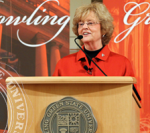BGSU President Selected
Friday, April 1st, 2011 When they return to school next fall, Bowling Green State University students will have a new president. Dr. Mary Ellen Mazey was chosen last week to be the BGSU’s 11th president.
When they return to school next fall, Bowling Green State University students will have a new president. Dr. Mary Ellen Mazey was chosen last week to be the BGSU’s 11th president.
Students say that being open to suggestions and opinions of university staff and students is a good quality for a leader to have. According to a story on the BGSU website, after being chosen for the job, Mazey said, “the next few months will be a learning experience … the first thing that I’ll be doing is listening.” Business major Nicole Neyer, 20, from Cincinnati, Ohio, said that by communicating with students and staff, Mazey will find out what the university needs, and be able to effectively make the university better.
Mazey has thirty years experience working in higher education, twenty-six of which were in Ohio. Rachel Tobe, 20, a dietetics student from Fort Recovery, Ohio, said that because of her experience, Mazey “knows where education’s lacking, and knows the ultimate goals of education.” She knows what it is like to run a university, and can find and fix faults in the system.
In a Toledo Blade article, Mazey said she understands that one of her biggest challenges will be balancing the university’s budget. She has experience dealing with cutbacks, including $100 million in cuts at her current institution. At BGSU, one strategy Mazey will use is to find ways that BGSU can increase its own revenues. “We’ll do everything we can to continue to build BGSU through these difficult times,” she said in the Blade article. “We can’t let [state cuts] stop us.” Students said that this experience will help her to know what should or shouldn’t be cut.
Kaitlyn Pukansky, 18, an environmental science student from Colorado Springs, Colo., said if funding to student organizations is reduced, some groups will need to learn how to fundraise for themselves, but everyone will adapt to budget changes.
Architecture major Elissa Barnes, 19, from Port Clinton, Ohio, says that even though everyone will not agree with Mazey’s decisions, she should do what she thinks is right, and be sure to listen to the other side’s opinions on budget issues.
Several students were concerned that the budget reductions may lead to higher tuition rates. One student said she wasn’t concerned about budget cuts “just as long as they don’t bother me. And tuition doesn’t go up.”









